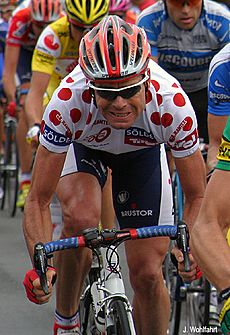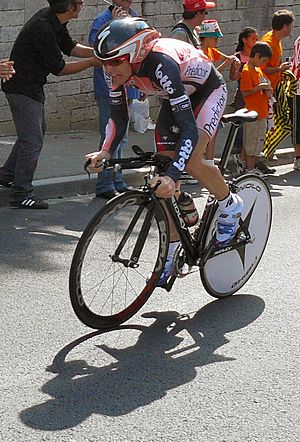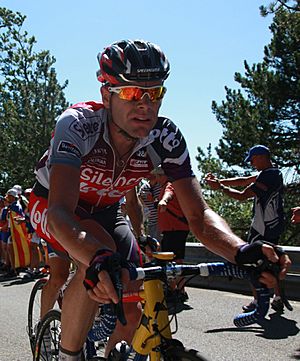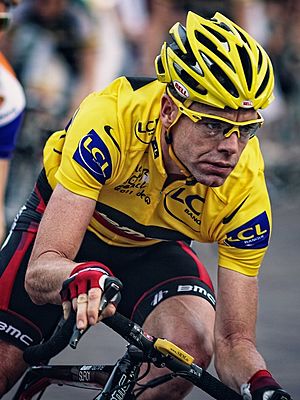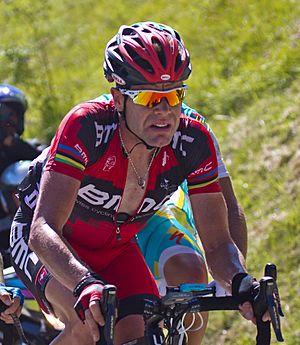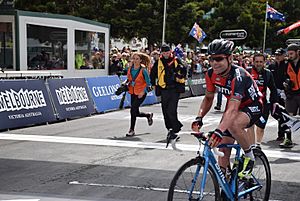Cadel Evans facts for kids
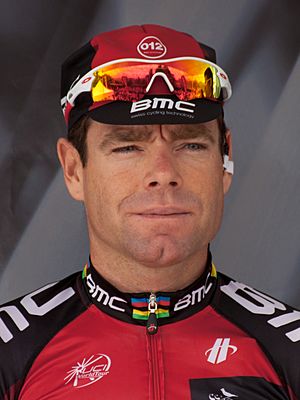
Evans at the 2012 Critérium du Dauphiné
|
|||
| Personal information | |||
|---|---|---|---|
| Full name | Cadel Lee Evans | ||
| Born | 14 February 1977 Katherine, Northern Territory, Australia |
||
| Height | 1.74 m (5 ft 8+1⁄2 in) | ||
| Weight | 64 kg (141 lb; 10 st 1 lb) | ||
| Team information | |||
| Current team | Retired | ||
| Discipline | Road, Mountain bike | ||
| Role | Rider | ||
| Rider type | All-rounder | ||
| Major wins | |||
|
|||
Cadel Lee Evans (born 14 February 1977) is a famous Australian former professional racing cyclist. He competed in both mountain biking and road bicycle racing. Cadel Evans is one of only three non-European riders to ever win the Tour de France. He achieved this amazing feat in 2011.
Early in his career, Cadel was a top mountain biker. He won the UCI Mountain Bike World Cup in 1998 and 1999. He also placed seventh in the mountain bike race at the 2000 Summer Olympics in Sydney. Cadel Evans competed in the Olympics four times. He switched to full-time road cycling in 2001. He quickly became a strong competitor. He finished second in the Tour de France in 2007 and 2008. These were some of the closest Tour de France races ever! He was the first Australian to win the UCI ProTour in 2007. He also won the UCI Road World Championships in 2009.
After not finishing in the top twenty in 2009 and 2010, Cadel Evans made history. He became the first Australian rider to win the Tour de France in 2011. He rode for the BMC team. He took the lead on the second-to-last day. He completed a 42.5 km (26.4 mi) individual time trial much faster than his closest rivals. At 34 years old, he was one of the oldest winners in the race's history. He also placed third in the 2009 Vuelta a España and the 2013 Giro d'Italia.
Cadel Evans retired from cycling on 1 February 2015. He finished his career by competing in a race named in his honor.
Contents
Cadel's Early Life and Childhood
Cadel Evans was born on 14 February 1977. He was born in Katherine, Northern Territory, Australia. His mother, Helen, was a bank manager, and his father, Paul, was a council foreman. He spent his early years in a small Aboriginal community called Barunga, Northern Territory. This community is about 80 km (50 mi) east of Katherine.
When he was seven, a horse accidentally hit him in the head. He was in a special medical sleep for seven days to help him recover. In 1986, his parents separated. He moved with his mother first to Armidale, New South Wales. Then they moved to Eltham, Victoria, a suburb of Melbourne. His mother still lives there. Cadel went to Newling Public School and Eltham High School. He enjoyed Skateboarding as a teenager. His father said Cadel was a good student. He was just a normal kid who left his toys around. His father never imagined Cadel would become a world-class athlete.
Cadel's Cycling Journey
Starting with Mountain Biking
Cadel Evans began his international cycling career in 1995. He was a scholarship holder in the Australian Institute of Sport (AIS) mountain bike (MTB) program. Tests showed he had an amazing ability. He had very large lungs and could take in more oxygen than almost anyone else. This special ability earned him the nickname 'The Lung'.
Cadel won bronze medals at the 1995 Junior world mountain bike championship. He also won a bronze at the Junior world road time trial championship. He earned silver medals at the 1997 and 1999 under-23 world championships. He won the cross-country event in the UCI Mountain Bike World Cup in both 1998 and 1999. In 1997, he rode for the Diamondback MTB team. Later, he joined the Volvo–Cannondale MTB team.
In March 2017, Cadel returned to mountain biking. He competed in the Masters category at the eight-day Cape Epic race in South Africa. He teamed up with George Hincapie, who was his teammate during his 2011 Tour de France win. They won their category together.
Moving to Road Cycling
Cadel Evans showed his talent in road cycling at the 1999 Tour of Tasmania. A famous commentator, Phil Liggett, even said Cadel would win the Tour de France one day. But Cadel didn't fully switch to road cycling until 2001. He joined the Saeco team that year. He spent one year with Saeco and another with Mapei in 2002. Then he rode for T-Mobile for two years (2003–2004).
Other early successes included winning the Tour of Austria in 2001 and 2004. He finished 14th in the 2002 Giro d'Italia. He even wore the pink jersey, which means he was leading the race, for one day. He became the Commonwealth Games time trial champion in 2002. He also won a stage in the 2002 Tour Down Under.
At Mapei, Cadel was coached by Aldo Sassi. Sassi helped him change from a mountain biker to a grand tour rider. After Sassi passed away in 2010, Cadel continued to work with Sassi's student, Andrea Morelli. When Cadel won the Tour de France in 2011, he dedicated his victory to his late coach.
Davitamon–Lotto Team (2005–2009)
In 2005, Cadel joined the Davitamon–Lotto team. He finished eighth in his first Tour de France. This made him the first Australian in the top ten since Phil Anderson. He also finished fifth at the 2005 Deutschland Tour.
In 2006, Cadel started the season by winning the mountains classification in the 2006 Tour Down Under. He then won the 2006 Tour de Romandie. He beat Spanish riders Alberto Contador and Alejandro Valverde in the final stage. He finished fifth in the 2006 Tour de France. Later, he was moved to fourth place after the winner, Floyd Landis, was disqualified. Cadel was also named Australian Cyclist of the Year.
In the 2007 Tour de France, Cadel finished second to Contador. He won stage 13, which was an individual time trial. He also came second in the stage 19 individual time trial. Cadel finished fourth in the 2007 Vuelta a España. He came fifth in the world championship. He won the overall 2007 UCI ProTour classification. He was named Australian Cyclist of the Year again.
The 2008 season was very successful for Cadel. He became one of Australia's most successful cyclists. He had two second-place finishes in the Tour de France. Cadel was a favorite to win the 2008 Tour de France. He wore the yellow jersey, meaning he was leading the race, from stages 10 to 14. However, on stage 17, Carlos Sastre gained a lot of time on Cadel. In the final time trial, Cadel needed to be 1 minute 34 seconds faster than Sastre. He beat Sastre and moved to second place overall. But he was still 58 seconds behind Sastre at the end of the Tour.
While recovering from a knee injury, Cadel competed in the men's road race at the Beijing Olympics. He finished 15th. Four days later, he placed fifth in the road time trial.
In 2009, Cadel won the Settimana Internazionale di Coppi e Bartali. He also won the 2009 Critérium du Dauphiné Libéré. His 2009 Tour de France race was difficult. He finished 30th, far behind the winner. Cadel finished third overall in the 2009 Vuelta a España. He wore the gold leader's jersey for one day. His race was affected by a bike problem on a mountain climb. Cadel joined a special group of cyclists. These riders have worn all three leader's jerseys: the pink jersey (Giro d'Italia), the yellow jersey (Tour de France), and the gold jersey (Vuelta a España).
Cadel went on to win the road race at the UCI Road World Championships in Switzerland. This happened on 27 September. He was awarded Australian Cyclist of the Year for the third time.
BMC Racing Team (2010–2015)
At the end of 2009, there was a lot of talk about Cadel looking for a new team. He wanted a team that could better support him at the 2010 Tour de France. After he became world champion, he seemed to focus on helping his teammate. But then it was announced that Cadel would leave the team. He said he was looking for "new challenges."
2010 Season Highlights
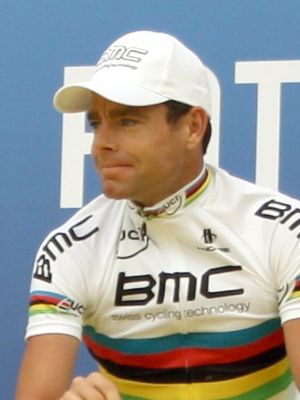
In 2010, Cadel moved to the BMC Racing Team. He had success in La Flèche Wallonne. He also led the general classification after Stage 2 of the Giro d'Italia. Cadel won stage seven of the race with a powerful sprint. This stage was called "the mud stage" because of heavy rain and dirt roads. Riders were covered in mud! Cadel finished the Giro in 5th place overall. He won the points classification. Cadel also wore the yellow jersey for stage nine of the 2010 Tour de France. He was riding with a small fracture in his left elbow from a crash. He lost a lot of time to the leaders during stage nine. This made him lose the yellow jersey and his chance for overall victory. He finished the Tour in 26th place.
2011 Tour de France Victory
Cadel had a much better start to 2011. He won stage 4 and the overall race at Tirreno–Adriatico. He also won the overall race at the Tour de Romandie. Both of these races were part of the 2011 UCI World Tour. Cadel skipped the Giro d'Italia to prepare for the Tour de France. He finished second in the Criterium du Dauphine, a major warm-up race for the Tour. This was his fourth time finishing second in the Dauphine.
Cadel finished second on stage one of the Tour de France. He won stage 4, which was his third Tour de France stage win. He then led the mountains classification for one day. As the Tour continued, Cadel often had to chase down groups of riders who had broken away. He wanted to keep his position in the top 5. He also wanted to save time for the individual time trial on stage 20. During stage 19, Cadel had to chase a group that included Alberto Contador. Contador was trying to win his fourth Tour de France. Cadel had a bike problem and had to change bikes. He again led the main group to catch the contenders. This kept him close enough to win.
On the time trial, the last stage before Paris, Cadel took the lead. He finished second in the stage, beating the previous leader by 2 minutes and 31 seconds. With this win, he became the first Australian to win the Tour de France. He was also the second non-European to officially win it. At 34, he was the oldest winner of the overall race in the modern era.
Cadel's win caused huge celebrations in Australia. Many people called for a national holiday. His win was compared to Australia's greatest sporting achievement, the 1983 America's Cup. Australian Prime Minister Julia Gillard called to congratulate him. Cadel said he wasn't sure how his win would be received in Australia. He said, "It's been a long, long process and it will take a long time to realise what it means. A few people always believed in me and they're the people that matter the most. We did it." When he returned to Australia, tens of thousands of people came to a parade in Melbourne. Many wore yellow and waved yellow flags. A special reception was held in his honor.
2012 Season Challenges
In March 2012, Cadel won the overall race at the 2012 Critérium International. This was a three-stage race. He won the second stage, a 6.5 km (4.0 mi) individual time trial. He kept his lead in the final stage. Cadel also won stage 1 of the 2012 Critérium du Dauphiné. He attacked on the last downhill section and out-sprinted two riders. Cadel finished third overall in the general classification. He also won the points classification jersey.
Cadel started the 2012 Tour de France hoping to win again. On stage 7, he finished second. He had the same time as rival Bradley Wiggins. Wiggins took the yellow jersey. Cadel then lost a lot of time on the ninth stage individual time trial. He finished sixth, over a minute and a half behind Wiggins. He had another problem in the mountains on stage 11. He tried a bold attack with his teammate. But the escape failed. He lost more time to the race leader.
On stage 14, Cadel had three flat tires because tacks were thrown on the road. His team helped him catch up. Cadel fell out of contention on stage 16. He lost contact with the leaders on a climb. He finished the Tour in seventh place. He said he was sick, which affected his performance. He stated he would be back as BMC's leader in 2013.
Cadel was chosen for the Australian teams for the road race and time trial at the London Olympics. However, he didn't do well in the road race. He then pulled out of the time trial, saying he was tired. A few weeks later, he canceled his other races for 2012. He said he was exhausted and didn't want to hurt his 2013 season.
2013 and 2014 Seasons
Cadel's 2013 season started well. He finished third in the 2013 Tour of Oman. His plan was to ride both the Giro d'Italia and the Tour de France. In April, he placed eighth in the 2013 Giro del Trentino. This was a short race to prepare for the Giro. The Giro d'Italia had very cold and wet weather. It was called "one of the more grueling Grand Tours in recent memory." Despite the challenges, Cadel was in second place for a long time. He lost his second place on the last mountain stage. This stage was affected by snowfall. He still managed to finish third in the overall race.
Cadel was the leader for his team in the Tour de France. But he had major difficulties. He was often dropped from the leading group in the mountains. His teammate helped him, but it wasn't enough. The Tour was a big disappointment for his team. Cadel finished 39th.
In September 2014, Cadel announced he would retire in February 2015. Cadel participated in the first Cadel Evans Great Ocean Road Race in 2015. He finished fifth. After retiring, Cadel became a Global Ambassador for the BMC Racing Team.
Cadel's Life Outside Cycling
In 2005, Cadel married Chiara Passerini. She is an Italian pianist and music teacher. They met in late 2002. Cadel asked her to marry him after his first Tour de France. In January 2012, they adopted their son, Robel, from Ethiopia. He was six months old. Cadel and Chiara separated in 2015. Since 2015, he has been dating Stefania Zandonella, a ski instructor from Italy. Their son, Aidan, was born in 2019.
Cadel's grandfather was from Wales. So, Cadel was named after three Welsh kings. His first cousin is Australian Paralympian Matthew Haanappel.
Cadel's home in Australia is in Barwon Heads, Victoria. When he is in Europe, he lives in Stabio, Switzerland.
Cadel Evans was honored as a Member (AM) of the Order of Australia on 10 June 2013. This is a special award for his achievements.
Cadel supports the Geelong Cats in the Australian Football League. A book about his life, Cadel Evans: Close To Flying, was published in November 2009.
Giving Back and His Views
When Cadel won The Sydney Morning Herald 2007 Sports Performer of the Year, he promised to donate his $50,000 prize to charity. Some of the money went to the Amy Gillett Foundation. This foundation was started to honor Australian cyclist Amy Gillett. She was killed in Germany in 2005 when a car hit her and her teammates. Another charity he supported was Ian Thorpe's Fountain for Youth. This charity helps young people with illnesses. Cadel mentioned that Ian Thorpe had visited the Aboriginal community where Cadel lived as a child.
In 2008, Cadel wore a cycling shirt with the Flag of Tibet. He supported freedom for Tibet. He said he wanted to help raise awareness for the Tibet movement. He felt sorry for the people there. He said they don't harm anyone, but their culture was being taken away. He didn't want to see what happened to Aboriginal culture in Australia happen to another culture.
Cadel Evans has also supported youth mental health. Since 2010, he has taken part in the annual Suit Up & Ride cycling event in Melbourne. This event helps Orygen Youth Health.
Cadel's Career Achievements
Road Cycling Successes
- 1995
- 3rd
 Time trial, UCI World Junior Championships
Time trial, UCI World Junior Championships - 1998
- 6th Overall À travers Lausanne
- 7th Overall Giro del Friuli-Venezia Giulia
- 9th Time trial, UCI World Under-23 Championships
- 1999
- 1st
 Overall Tour of Tasmania
Overall Tour of Tasmania
- 1st Stage 3
- 1st
 Young rider classification, Tour Down Under
Young rider classification, Tour Down Under - 2001
- 1st
 Overall Tour of Austria
Overall Tour of Austria
- 1st Stage 4
- 1st
 Overall Brixia Tour
Overall Brixia Tour - 1st À travers Lausanne
- 2nd Japan Cup
- 6th Giro dell'Appennino
- 8th Overall Bayern–Rundfahrt
- 9th Giro dell'Emilia
- 10th Overall Tour Down Under
- 2002
- Commonwealth Games
- 3rd Overall Settimana Internazionale di Coppi e Bartali
- 1st Stage 1
- 3rd Overall Tour de Romandie
- 4th Overall Tour Down Under
- 1st
 Mountains classification
Mountains classification - 1st Stage 5
- 1st
- 6th Overall Tour of the Basque Country
- 6th Overall Uniqa Classic
- 1st Stage 4
- 8th Gran Premio di Chiasso
- 10th Overall Paris–Nice
- Giro d'Italia
- Held
 after Stage 15–16
after Stage 15–16
- Held
- 2003
- 8th Overall Vuelta a Murcia
- 10th Overall Tour Down Under
- 1st
 Mountains classification
Mountains classification
- 1st
- 2004
- 1st
 Overall Tour of Austria
Overall Tour of Austria
- 1st Stage 2
- 3rd Overall Vuelta a Murcia
- 4th Milano–Torino
- 4th Giro di Lombardia
- 5th Overall Regio-Tour
- 2005
- 4th Road race, National Championships
- 5th Overall Deutschland Tour
- 1st Stage 7
- 5th Liège–Bastogne–Liège
- 8th Overall Paris–Nice
- 8th Overall Tour de France
- 9th La Flèche Wallonne
- 2006
- 1st
 Overall Tour de Romandie
Overall Tour de Romandie
- 1st Stage 5 (ITT)
- 1st
 Mountains classification, Tour Down Under
Mountains classification, Tour Down Under - 2nd Overall Tour de Pologne
- 4th Overall Tour de France
- 7th Overall Tour of California
- 8th Overall Tour of the Basque Country
- 10th Overall Settimana Internazionale di Coppi e Bartali
- 10th Overall Tour de Suisse
- 10th Overall Danmark Rundt
- 2007
- 1st UCI ProTour
- 1st Stage 2 (ITT) Test Event Beijing 2008
- 1st Stage 1b (TTT) Settimana Internazionale di Coppi e Bartali
- 2nd Overall Tour de France
- 1st Stage 13 (ITT)
- 2nd Overall Critérium du Dauphiné Libéré
- 4th Overall Vuelta a España
- 4th Overall Tour de Romandie
- 5th Road race, UCI World Championships
- 6th Giro dell'Emilia
- 6th Giro di Lombardia
- 7th Overall Paris–Nice
- 2008
- 1st
 Overall Settimana Internazionale di Coppi e Bartali
Overall Settimana Internazionale di Coppi e Bartali
- 1st Stage 3
- 1st Stage 4 Paris–Nice
- 2nd Overall Tour de France
- Held
 after Stages 10–14
after Stages 10–14
- Held
- 2nd Overall Tour of the Basque Country
- 2nd Overall Critérium du Dauphiné Libéré
- 2nd La Flèche Wallonne
- 3rd Overall Vuelta a Andalucía
- 1st Stage 2
- 5th Time trial, Olympic Games
- 6th Giro dell'Emilia
- 7th Liège–Bastogne–Liège
- 2009
- 1st
 Road race, UCI World Championships
Road race, UCI World Championships - 2nd Overall Settimana Internazionale di Coppi e Bartali
- 1st Stage 5
- 2nd Overall Critérium du Dauphiné Libéré
- 1st
 Points classification
Points classification - 1st Stage 1 (ITT)
- 1st
- 3rd Overall Vuelta a España
- Held
 after Stage 7
after Stage 7 - Held
 after Stages 7–10
after Stages 7–10
- Held
- 4th Overall Tour of the Basque Country
- 4th Giro dell'Emilia
- 5th UCI World Ranking
- 5th La Flèche Wallonne
- 7th Overall Tour de Romandie
- 10th Giro di Lombardia
- 2010
- 1st La Flèche Wallonne
- 3rd Overall Tirreno–Adriatico
- 3rd Grand Prix de Wallonie
- 4th UCI World Ranking
- 4th Gran Premio dell'Insubria-Lugano
- 4th Liège–Bastogne–Liège
- 5th Overall Giro d'Italia
- 1st
 Points classification
Points classification - 1st Stage 7
- Held
 after Stage 1
after Stage 1
- 1st
- 6th Overall Tour Down Under
- 6th Overall Critérium International
- Tour de France
- Held
 after Stage 8
after Stage 8
- Held
- 2011
- 1st
 Overall Tour de France
Overall Tour de France
- 1st Stage 4
- Held
 after Stages 4–5
after Stages 4–5
- 1st
Overall Tirreno–Adriatico
- 1st Stage 6
- 1st
 Overall Tour de Romandie
Overall Tour de Romandie - 2nd UCI World Tour
- 2nd Overall Critérium du Dauphiné
- 7th Overall USA Pro Cycling Challenge
- 7th Overall Volta a Catalunya
- 2012
- 1st
 Overall Critérium International
Overall Critérium International
- 1st
 Points classification
Points classification - 1st Stage 2 (ITT)
- 1st
- 3rd Overall Critérium du Dauphiné
- 1st
 Points classification
Points classification - 1st Stage 1
- 1st
- 7th Overall Tour de France
- 2013
- 1st Stage 4 Tour of Alberta
- 3rd Overall Giro d'Italia
- Held
 after Stages 9–11
after Stages 9–11
- Held
- 3rd Overall Tour of Oman
- 8th Overall Giro del Trentino
- 2014
- 1st
 Overall Giro del Trentino
Overall Giro del Trentino
- 1st Stages 1 (TTT) & 3
- 2nd Road race, National Championships
- 2nd Overall Tour Down Under
- 1st Stage 3
- 5th Overall Tour du Haut Var
- 6th Overall Tour of Utah
- 1st Stages 6 & 7
- 7th Overall Tour of the Basque Country
- 7th Strade Bianche
- 8th Overall Giro d'Italia
- Held
 after Stages 8–11
after Stages 8–11
- Held
- 2015
- 3rd Overall Tour Down Under
- 5th Cadel Evans Great Ocean Road Race
Mountain Bike Successes
- 1993
- 1st
Cross-country, National Youth Championships
- 1994
- 1st
Cross-country, National Junior Championships
- 2nd
 Cross-country, UCI World Junior Championships
Cross-country, UCI World Junior Championships - 1995
- 3rd
 Cross-country, UCI World Junior Championships
Cross-country, UCI World Junior Championships - 1996
- 1st
Cross-country, National Championships
- 3rd
 Cross-country, UCI World Under-23 Championships
Cross-country, UCI World Under-23 Championships - 9th Cross-country, Olympic Games
- 1997
- 1st
Cross-country, National Championships
- 2nd
 Cross-country, UCI World Under-23 Championships
Cross-country, UCI World Under-23 Championships - 3rd Overall UCI World Cup
- 1st Wellington
- 1st Vail
- 2nd Sankt Wendel
- 2nd Budapest
- 1998
- 1st
 Overall UCI World Cup
Overall UCI World Cup
- 1st Sea Otter Classic
- 1999
- 1st
 Overall UCI World Cup
Overall UCI World Cup
- 1st Madrid
- 2nd Napa Valley
- 2nd Sydney
- 2nd Big Bear Lake
- 2nd Canmore
- 1st Sea Otter Classic
- 2nd
 Cross-country, UCI World Under-23 Championships
Cross-country, UCI World Under-23 Championships - 3rd Houffalize, Vayamundo MTB Cup
- 2000
- UCI World Cup
- 1st Mont-Sainte-Anne
- 1st Canmore
- 3rd Cross-country, National Championships
- 7th Cross-country, Olympic Games
- 2001
- 2nd
 Team relay, UCI World Championships
Team relay, UCI World Championships - 2nd Cross-country, National Championships
- UCI World Cup
- 2nd Kaprun
- 3rd Grouse Mountain
Awards and Honors
Cadel Evans has won the Sir Hubert Opperman Trophy four times (2006, 2007, 2009, 2011). This award is given to the Australian cyclist of the year. On 10 June 2013, Cadel Evans was honored as a Member (AM) in the General Division of the Order of Australia. In 2020, Cadel Evans was added to the Sport Australia Hall of Fame.
See also
 In Spanish: Cadel Evans para niños
In Spanish: Cadel Evans para niños
 | Sharif Bey |
 | Hale Woodruff |
 | Richmond Barthé |
 | Purvis Young |


